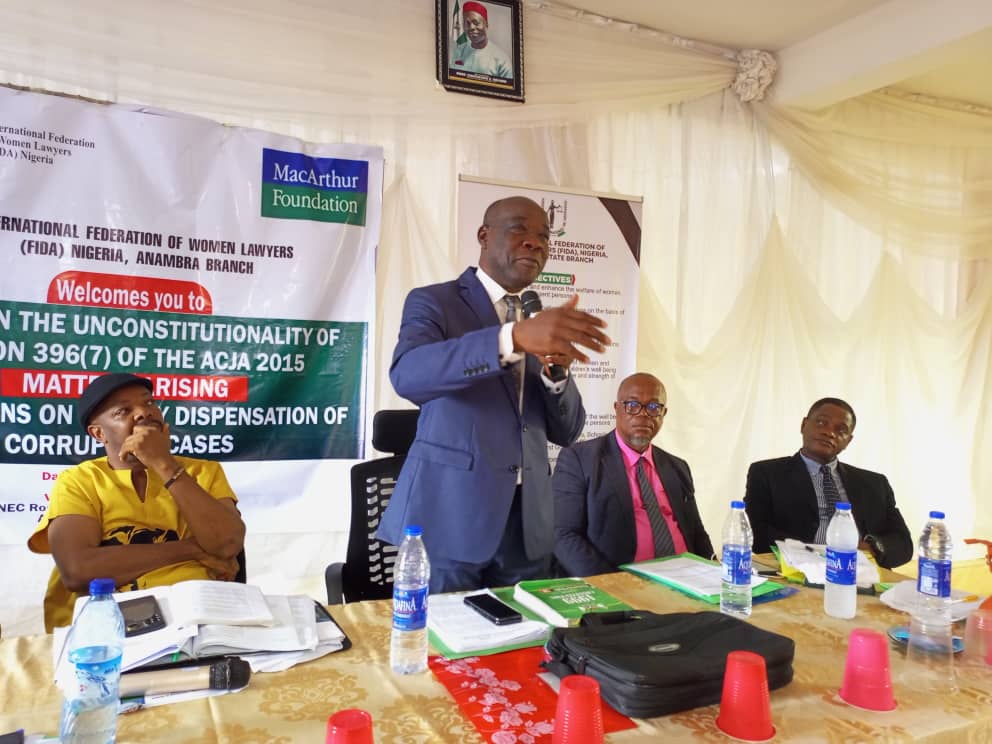Lawrence Nwimo, Awka
Stakeholders from different sectors have called for judicial and other institutional reforms to facilitate the speedy dispensation of justice in the country’s judicial system.
The call was made at a one-day workshop entitled: “The unconstitutionality of section 396(7) of the ACJA 2015, matters arising: Implications on the speedy dispensation of corruption cases,” organised by the International Federation of Women Lawyers (FIDA) Nigeria, Anambra State branch in collaboration with MacArthur Foundation.
At the event which centered on how to expedite the trial of criminal cases particularly, the stakeholders which included erudite scholars, legal luminaries, veteran journalists, pro-democracy groups, and human rights activists harped on the need to raise the bar of justice delivery through reforms that will aid speedy prosecution and delivery of justice.
In his paper presentation, the Administrative Judge of Ogidi Judicial Division, Hon Justice Peter Obiorah, complained that despite the upsurge in serious criminal activities in the country, there has been an attendant decline in the rate of criminal prosecutions.
He said the poor and slow-paced prosecution of criminal cases has continued to embolden criminal and corrupt activities as elements of deterrence are no longer there to scare away and discourage persons with criminal intentions.
He said the condition has left many unfortunate defendants who are not able to employ all known means of frustrating trials like their rich counterparts to languish for years in custody.
He further said the upsurge in crime and corruption has continued to paint an overall picture in the eyes of the public particularly the international community that the country is a haven for criminal activities, which according to him, has impacted negatively on the perception of Nigerians living in foreign lands.
Justice Obiorah whose paper sought the contextual understanding of the provisions of Section 396 subsection 7 of the Administration of Criminal Justice (ACJA) 2015, said despite the factors that necessitated the provision, it has made the judge hybrid as well as the tendency to hamper the administration of justice in the land.
“The law is simply saying that when a high court judge hearing a criminal matter is elevated to the Court of Appeal, the said Judge (now CJA) will have a double personality and bestride two different courts established under the constitution albeit for specific purposes.
“He continues to act as a High Court Judge for the specific purpose of concluding all part-heard criminal matters while he sits fully in the Court of Appeal as JCA hearing all cases within the jurisdiction of the Court of Appeal.
There is no doubt that one major factor that influenced this controversial provision of the law is the fear of starting criminal cases de novo before another High Court Judge and the obvious loss of the energy, resources, and judicial time spent in getting the case to the part-heard stage.
“The question to agitate our mind is whether it is possible, under our current constitutional framework, for a judicial officer to sit in two different capacities or two different courts for whatever purpose?”
The legal luminary said another cog in the wheel of prompt justice delivery include the dearth of physical infrastructure, poor welfare packages, and resources to effectively execute judicial processes.
Earlier in her address, Chairperson FIDA Anambra State branch, Genevieve Osakwe, said the objective of the workshop was to provide a platform for Criminal Justice Actors to explore practical solutions in advancing speedy trials of corruption cases in the light of the unconstitutionality of the provision of section 396 (7) of the ACJA as decided by the Supreme Court in Udeogu v FRN & Ors.
She said the workshop aims at developing a policy statement that will serve as an advocacy tool to relevant stakeholders as well as provide the platform for shared learning approaches by criminal justice actors in examining challenges and implications of the Supreme Court Judgments on pending corruption cases undergoing trials at various courts of law.
In his goodwill message, the Chief Judge of Anambra State, Hon Justice Onochie Anyachebelu represented by Mike Anyadiegwu, said the points raised at the workshop will lead to a solution to the delays with a view also to seeing that court hears criminal matters with dispatch and speed.

